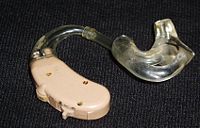Assistive device

Assistive devices are tools or gadgets that can help people with disabilities or special needs do things that might be difficult for them to do on their own.
Think of it like this: sometimes, people need some extra help to complete tasks that might be easy for others. For example, if you can't walk, you might use a wheelchair to get around. If you can't see well, you might use a magnifying glass or special glasses to help you read better.
Assistive devices come in all shapes and sizes. Some examples include:
- motorized wheelchairs or scooters
- hearing aids or cochlear implants
- prosthetic limbs
- voice recognition software
- grab bars in the bathroom
- special utensils for eating
Assistive devices are designed to make life easier for people with disabilities or special needs, so they can live more independently and participate more fully in their communities. They are often recommended by doctors, therapists, or other healthcare professionals, and can be purchased or rented from medical supply stores or online retailers.
Think of it like this: sometimes, people need some extra help to complete tasks that might be easy for others. For example, if you can't walk, you might use a wheelchair to get around. If you can't see well, you might use a magnifying glass or special glasses to help you read better.
Assistive devices come in all shapes and sizes. Some examples include:
- motorized wheelchairs or scooters
- hearing aids or cochlear implants
- prosthetic limbs
- voice recognition software
- grab bars in the bathroom
- special utensils for eating
Assistive devices are designed to make life easier for people with disabilities or special needs, so they can live more independently and participate more fully in their communities. They are often recommended by doctors, therapists, or other healthcare professionals, and can be purchased or rented from medical supply stores or online retailers.
Related topics others have asked about:
